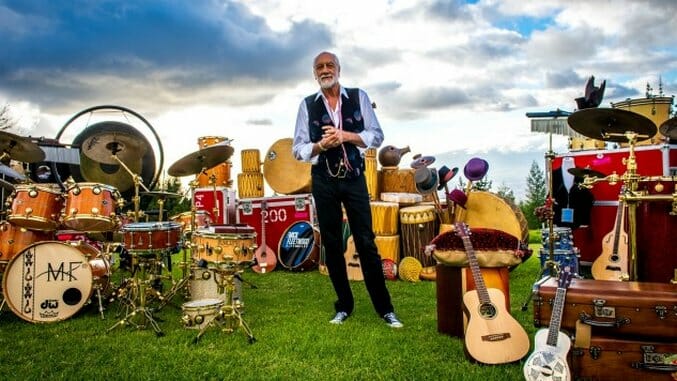Mick Fleetwood Chats About Starting Fleetwood Mac: “It Was to Do With Pain”
The legendary drummer chronicles the first chapter of his band in Love That Burns.
Photo: Daniel Sullivan
Any music fan with a working knowledge of Fleetwood Mac can probably name at least five of the classic-rock titans’ hits: “Landslide,” “Rhiannon,” “The Chain,” “Dreams,” “You Make Loving Fun”—that is, the omnipresent radio fare that dominated airwaves in the late 1970s and early ‘80s, bolstered by Lindsey Buckingham’s guitar and Stevie Nicks’s and Christine McVie’s vocals. But that band was really the American sequel to Fleetwood Mac. Their origins trace back to 1967 and London’s mid-century blues explosion, with guitarist Peter Green at the helm and guitarist Jeremy Spencer, bassist Bob Brunning and percussionist Mick Fleetwood (the only member to survive every lineup change) at his side.
The newborn Fleetwood Mac played a well-crafted facsimile of Chicago blues, plus some faithful covers of its progenitors, mostly Elmore James and Howlin’ Wolf. The group’s lineup would famously turn over in the years ahead, with John McVie assuming bass duties and his then-wife, keyboardist Christine McVie, coming on board later. Once Buckingham and Nicks joined up in 1974, the California edition of Fleetwood Mac found overwhelming mainstream success with celebrated records like Rumours (1977), Tusk (1979) and Mirage (1982).
It’s too much to fit in one book, so Mick Fleetwood has essentially written Chapter 1 with Love That Burns: A Chronicle of Fleetwood Mac, which came out Wednesday via Genesis Publications. It chronicles the band’s blues era via essays and photos, and pays homage to Green, who left the band in 1970 and has struggled off and on with mental illness in the decades since.
Paste caught up with Fleetwood, who turned 70 in June, for a conversation about his role in the formation of Fleetwood Mac, what Green said to convince him to join, and what’s kept him invested in the band after half a century.
Paste: What inspired you to discuss the genesis of the band in this way, and why did you choose to do it with the visual aspects of this book?
Mick Fleetwood: More than 20 years ago, I saw one of the lovely presentations of George Harrison’s original book. George used to be my brother-in-law, so that’s how I blundered into seeing the book. Beautiful, it was like a piece of art. The book itself started the original fantasy of, “One day, I’ll do that,” type of thing. It went off the radar, but that’s how they’re connected to this book. I wanted to do “Part 1,” or whatever you want to call it. I was totally unaware of the fact that, apart from the original members, in August, it’s 50 years [since Fleetwood Mac formed]. Totally not a part of why we were doing this. Now it’s hugely relevant.
And you intend to put out a second volume, is that right?
It has to be. That’s what’s so cool about this. Whether that happens or it [doesn’t], Genesis were super, super focused and cool with saying it, and that has real value just in it—If we never did another thing, this existed. Most people would say, “I want the whole thing.”
Why do just the band’s earliest days?
It’s too much information [otherwise]. Fleetwood Mac’s had so many incarnations and have delineated lines that are so clear, you go, “it should be done like this.” That’s what we did, and it’s been revealing. The title itself is a song that Peter [Green] used to sing.
And why choose Love That Burns for a title?
-

-

-

-

-

-

-

-

-

-

-

-

-

-

-

-

-

-

-

-

-

-

-

-

-

-

-

-

-

-

-

-

-

-

-

-

-

-

-

-










































